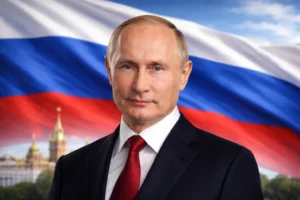Russian mercenary boss Yevgeny Prigozhin is buried in private

St. Petersburg, The Gulf Observer: A private burial was held for Yevgeny Prigozhin, ending a tumultuous journey from St. Petersburg street thug to Kremlin-financed mercenary leader, following a suspicious plane crash two months after his brief mutiny that challenged the authority of President Vladimir Putin.
His spokespeople said Tuesday a service took place behind closed doors, and directed “those who wish to bid their farewell” to the 62-year-old head of the Wagner private military contractor to go to the Porokhovskoye cemetery in his hometown. Their statement ended media speculation on where and when Prigozhin would be laid to rest, with his funeral shrouded in secrecy.
A wooden cross towered over his flower-covered grave. Nearby stood a Russian tricolor and a black Wagner flag. Russian media cited unidentified sources as saying Prigozhin was laid to rest Tuesday without any publicity, per his family’s wishes.
Members of the Russian National Guard were stationed along the fence at the cemetery, steering visitors away after it closed for the day.
Putin’s spokesman said the president would not attend the service. The Russian leader had decried the armed rebellion in June as “treason” and “a stab in the back.”
Russian state television, which for decades has served as the main source of information for the vast majority of Russians, barely covered the funeral at all.
One major channel, Russia 1, dedicated less than one minute of air time to it in its evening news bulletin, only to say that the funeral ceremony took place “without outsiders and the press at the request of the family” and that Prigozhin’s grave is right next to that of his father, who died in 1978. Another popular station, Channel One, ignored it completely in their evening news.
The secrecy and confusion surrounding the funeral of Prigozhin and his top lieutenants reflected a dilemma faced by the Kremlin amid swirling speculation that the crash was likely a vendetta for his June 23-24 uprising.
While it tried to avoid any pomp-filled ceremony for him, the Kremlin couldn’t afford to denigrate Prigozhin, who reportedly received Russia’s highest award for leading Wagner forces in Ukraine and was idolized by many of the country’s hawks.
Putin’s comments on Prigozhin’s death reflected that careful stand. He noted last week that Wagner leaders “made a significant contribution” to the fighting in Ukraine and described Prigozhin as a ”talented businessman” and “a man of difficult fate” who had “made serious mistakes in life.”
Sergei Markov, a pro-Kremlin political analyst, noted that Prigozhin has become a legendary figure for his supporters who are increasingly critical of the authorities.
“Prigozhin’s funeral raises an issue of communication between the bureaucratic Russian government system that doesn’t have much political potential and politically active patriotic segment of the Russian public,” Markov said.
Also on Tuesday, a funeral was held at St. Petersburg’s Northern Cemetery for Wagner’s logistics chief Valery Chekalov, who was among the 10 people killed in the crash. Prigozhin’s second-in-command, Dmitry Utkin, a retired military intelligence officer who gave the mercenary group its name based on his own nom de guerre, also was killed.
The fate of Wagner, which until recently played a prominent role in Russia’s military campaign in Ukraine and was involved in a number of African and Middle Eastern countries, is uncertain.
Putin said Wagner fighters could sign a contract with the Russian military, move to Belarus or retire from service. Several thousand went to Belarus, where they are in a camp southeast of the capital, Minsk.


